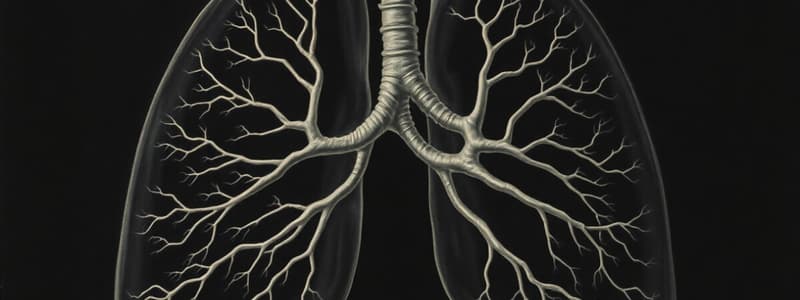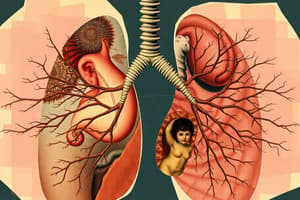Podcast
Questions and Answers
What condition is primarily caused by esophageal atresia in neonates?
What condition is primarily caused by esophageal atresia in neonates?
- Oligohydramnios
- Pulmonary hypoplasia
- Polyhydramnios (correct)
- Congenital diaphragmatic hernia
What is the most common cause of congenital diaphragmatic hernias in newborns?
What is the most common cause of congenital diaphragmatic hernias in newborns?
- Shortening of the diaphragm muscle
- Failure of the pleuroperitoneal membranes to close (correct)
- Underdevelopment of the esophagus
- Presence of a peritoneal sac
In congenital diaphragmatic hernias, where are the abdominal viscera typically found?
In congenital diaphragmatic hernias, where are the abdominal viscera typically found?
- In the pleural cavity (correct)
- In the heart's pericardial sac
- In the mediastinum
- In the abdominal cavity
What is a potential consequence of failure of the pericardioperitoneal canal to close?
What is a potential consequence of failure of the pericardioperitoneal canal to close?
Which of the following describes a parasternal hernia?
Which of the following describes a parasternal hernia?
What primary germ layer gives rise to the internal lining of the larynx?
What primary germ layer gives rise to the internal lining of the larynx?
Which components of the larynx are formed from mesenchyme?
Which components of the larynx are formed from mesenchyme?
At what gestational week does the laryngotracheal opening begin to take shape?
At what gestational week does the laryngotracheal opening begin to take shape?
What is the process called that leads to the reopening of the laryngeal cavity?
What is the process called that leads to the reopening of the laryngeal cavity?
Which pharyngeal arch is responsible for sensory and motor innervation above the vocal folds?
Which pharyngeal arch is responsible for sensory and motor innervation above the vocal folds?
Which nerves provide innervation to the laryngeal muscles and mucosa below the vocal folds?
Which nerves provide innervation to the laryngeal muscles and mucosa below the vocal folds?
What structure is formed from the mesenchyme between the 4th and 6th pharyngeal arches?
What structure is formed from the mesenchyme between the 4th and 6th pharyngeal arches?
At what point during development is the epiglottis formed?
At what point during development is the epiglottis formed?
What are the paired ventricles of the larynx formed from?
What are the paired ventricles of the larynx formed from?
Which cartilages complete their growth by the 12th week of gestation?
Which cartilages complete their growth by the 12th week of gestation?
What significant change occurs in the type II respiratory epithelial cells by week 26?
What significant change occurs in the type II respiratory epithelial cells by week 26?
Why is funding must be available to facilitate survival for premature births by week 26?
Why is funding must be available to facilitate survival for premature births by week 26?
At which gestational week is adequate blood-gas exchange possible for premature infants?
At which gestational week is adequate blood-gas exchange possible for premature infants?
What is the primary function of surfactant in the lungs?
What is the primary function of surfactant in the lungs?
What occurs during the canalicular period of lung development?
What occurs during the canalicular period of lung development?
How many generations of subdivisions does the respiratory tree undergo by the sixth month of gestation?
How many generations of subdivisions does the respiratory tree undergo by the sixth month of gestation?
What marks the terminal sac stage of lung development?
What marks the terminal sac stage of lung development?
What occurs after the alveolar stage of lung development in early childhood?
What occurs after the alveolar stage of lung development in early childhood?
What is a key developmental milestone reached by the end of week 26 concerning gas exchange?
What is a key developmental milestone reached by the end of week 26 concerning gas exchange?
What developmental period is characterized by the formation of the conducting system of the bronchial tree?
What developmental period is characterized by the formation of the conducting system of the bronchial tree?
During which period do terminal bronchioles start dividing into respiratory bronchioles?
During which period do terminal bronchioles start dividing into respiratory bronchioles?
What is the primary feature of the terminal sac stage in terms of cellular structure?
What is the primary feature of the terminal sac stage in terms of cellular structure?
Why is survival from premature birth not possible during the pseudoglandular period?
Why is survival from premature birth not possible during the pseudoglandular period?
What characterizes the ducts formed during the canalicular period?
What characterizes the ducts formed during the canalicular period?
At what stage are primitive terminal sacs first formed?
At what stage are primitive terminal sacs first formed?
What is the main challenge for premature infants born during the canalicular stage?
What is the main challenge for premature infants born during the canalicular stage?
What developmental structure emerges from terminal bronchioles during the canalicular period?
What developmental structure emerges from terminal bronchioles during the canalicular period?
Which of the following statements about the terminal sac stage is false?
Which of the following statements about the terminal sac stage is false?
What defines the epithelial lining of the respiratory bronchioles formed during weeks 16-24?
What defines the epithelial lining of the respiratory bronchioles formed during weeks 16-24?
What is the primary role of type II alveolar epithelial cells during lung development?
What is the primary role of type II alveolar epithelial cells during lung development?
What key development occurs during the canalicular period in lung formation?
What key development occurs during the canalicular period in lung formation?
What anatomical structure is primarily responsible for separating the pleural and pericardial cavities?
What anatomical structure is primarily responsible for separating the pleural and pericardial cavities?
Which condition involves a lack of communication between the esophagus and trachea during development?
Which condition involves a lack of communication between the esophagus and trachea during development?
What contributes to the muscular part of the diaphragm during development?
What contributes to the muscular part of the diaphragm during development?
What is a consequence of full esophageal atresia in fetal development?
What is a consequence of full esophageal atresia in fetal development?
Which anatomical structure's development is essential for the compartmentalization of the pleural and peritoneal cavities?
Which anatomical structure's development is essential for the compartmentalization of the pleural and peritoneal cavities?
During lung maturation, what is the final developmental period called?
During lung maturation, what is the final developmental period called?
Flashcards are hidden until you start studying
Study Notes
Lung Development Stages
- Pseudoglandular Period (Weeks 5-16): Formation of the conducting system of the bronchial tree.
- Canalicular Period (Weeks 16-24): Formation of the duct system for gas exchange.
- Terminal bronchioles divide into respiratory bronchioles.
- Cuboidal epithelium with smooth muscle and no cartilage.
- Rapidly forming capillary beds in surrounding mesenchyme.
- Premature birth survival unlikely due to no gas exchange.
- Terminal Sac Stage (Weeks 24-Birth): Formation of primitive terminal sacs (primordial alveolar sacs) off respiratory bronchioles.
- Single layer of flattened epithelial cells close to capillaries in mesoderm.
- Limited gas/blood exchange possible.
- Type II cells release surfactant by week 26, which supports premature birth survival.
- By week 26, sufficient alveolar sacs for adequate blood-gas exchange.
- 17 generations of subdivisions by the sixth month.
- 6 more subdivisions post-natally.
- Alveolar Stage (Late Gestation-Early Childhood): Maturation of the lungs.
- Alveoli expand and mature, increasing surface area for gas exchange.
Role of Breathing Movements in Lung Development
- Breathing movements expand the lungs, stimulating further development.
- This promotes formation of new airways, alveolar sacs, and capillaries.
- Essential for normal lung function.
Role of Type II Alveolar Epithelial Cells
- Produce surfactant, which reduces surface tension in the alveoli.
- Prevents alveolar collapse during exhalation.
- Critical for gas exchange and lung function.
Summary of Lung Maturation
- Lungs are not fully mature at birth, with continued development into early childhood.
- Premature birth before 26 weeks poses significant risks due to immature lungs.
Transition of Developing Lungs into the Pleural Cavity
- Early development within the splanchnic mesoderm.
- Expansion into the pericardioperitoneal canals and acquisition of visceral pleura.
- Mesothelial lining of the pleural cavity.
Formation of the Pericardial and Pleural Cavities
- Pleuropericardial Folds (Membranes):
- Contain cranial and caudal folds.
- Closure of the right and left pleuropericardial folds separates the pleural and pericardial cavities.
Formation of the Thoracic Diaphragm and Compartmentalization of the Pleural and Peritoneal cavities
- Septum Transversum: Forms the central tendon of the diaphragm.
- Pleuroperitoneal Folds (Membranes): Grow ventrally and meet the septum transversum, separating the pleural and peritoneal cavities.
- Myoblast Migration: Contributes to the muscular part of the diaphragm.
- Displacement of Diaphragm: Moves from the cervical region to the thoracic region.
- Innervation:
- Peripheral region of the diaphragm: Motor and sensory innervation from nerves associated with cervical segments.
- Central region of the diaphragm: Motor and sensory innervation from phrenic nerves originating from C3, C4, and C5 spinal segments.
Clinical Significance
-
Esophageal Atresia with or without Tracheoesophageal Fistulas:
- Atresia: Complete closure of the esophagus.
- Fistula: Abnormal connection between the esophagus and trachea.
- Esophageal Atresia with Tracheoesophageal Fistula: Can result in polyhydramnios, aspiration, and respiratory distress.
- Full Esophageal Atresia: Prevents swallowing and passage of amniotic fluid into the gastrointestinal tract, leading to polyhydramnios.
-
Diaphragmatic Hernias:
- Congenital: Most frequent cause is failure of one or both pleuroperitoneal membranes to close.
- Parasternal Hernia: Failure of muscle fibers formation near the sternal attachment.
- Esophageal Hernia: Under-development of the esophagus or failure of pericardioperitoneal canal closure.
Studying That Suits You
Use AI to generate personalized quizzes and flashcards to suit your learning preferences.



